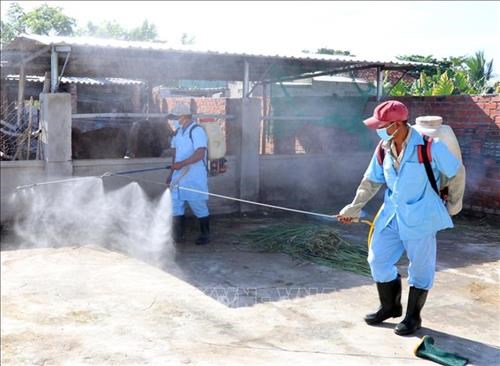 Society
Society


|
| Health workers spray chemical to kill mosquitoes in the central province of Bình Thuận. — VNA/VNS Photo Công Thử |
HÀ NỘI — Dengue fever infections could spike nationwide if drastic measures to control the disease are not taken, the Ministry of Health has warned.
According to the ministry, since the beginning of this year, dengue fever has been reported in almost all localities in Việt Nam.
By the middle of last month, nearly 30,000 dengue cases had been reported in 58 provinces and cities, of which, three people in the provinces of Bình Định, Bình Phước and Tây Ninh died of the disease.
Up to this week, 12 provinces and cities across the country, namely Nghệ An, Quảng Bình, Quảng Trị, Thừa Thiên-Huế, Quảng Nam, Quảng Ngãi, Bình Định, Phú Yên, Khánh Hoà, Bến Tre, HCM City and Hà Nội, reported new dengue cases weekly.
In the last six months, Hà Nội confirmed 634 dengue cases in 28 out of 30 its districts and 198 out of 579 communes/wards.
Hà Nội’s major dengue outbreaks are Tam Hiệp Commune in Phúc Thọ District (182 cases), Khánh Hà Commune in Thường Tín District (48 cases) and Thanh Thuỳ Commune in Thanh Oai District (44 cases).
According to the city’s Health Department, the number of dengue cases of this year is fewer than that in the same period of last year but in the last few weeks, the number has been increasing.
The central province of Hà Tĩnh on Monday announced the first outbreak of dengue fever appeared in the province this year.
At least six people in Tân Thành Hamlet, Kỳ Nam Commune, Kỳ Anh Town in the province were confirmed to have dengue, Nguyễn Chí Thanh, vice head of the province’s Centre for Diseases Control said.
The first reported case was a 41-year-old woman who returned from Quảng Bình Province which also reported cases of dengue.
Thanh said that as soon as the outbreak was detected, local authorities cleaned the environment and sprayed chemicals to kill mosquitoes and local residents were examined at the commune’s health centre.
The health ministry last week asked localities to speed up activities to kill larvae to once a week in high-risk areas where dengue cases were reported and twice a week in areas with a high density of mosquitoes/larvae.
Dangerous complications
Doctor Phạm Trung Cấp, head of the Emergency Department at the National Hospital for Tropical Diseases, said dengue fever had two common complications – a decrease in platelet counts and dangerously low blood pressure.
When a patient suffered from a low level of blood platelets, they would not feel fatigued so people easily ignore their symptoms until massive bleeding appeared. With dangerously low blood pressure, patients usually felt very fatigued, pain in the liver area, vomiting and drowsiness lasting for 24 to 48 hours.
Cấp said both complications were dangerous to patients. Bleeding could be seen easily but other complications were hard to see.
“Finding early warning signals of complications is very important,” Cấp said, adding that patients must go to the hospital at once when they see symptoms of bleeding, continuously vomiting, severe stomachache, unconsciousness, cold hands/feet or breathing difficulties.
People who continued having a high fever after taking medicine should also go to the hospital as soon as possible, Cấp said.
According to the Health Ministry, on average, Việt Nam reports more than 100,000 dengue cases yearly. However, last year, the number hit 320,331 cases, the highest figure in the last 32 years, with 53 deaths. — VNS




